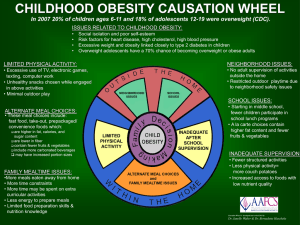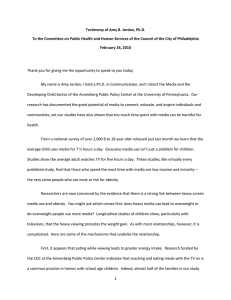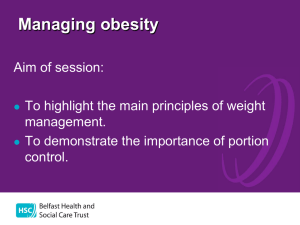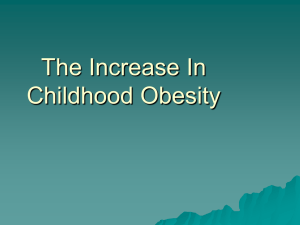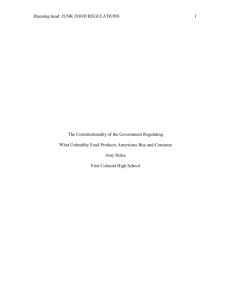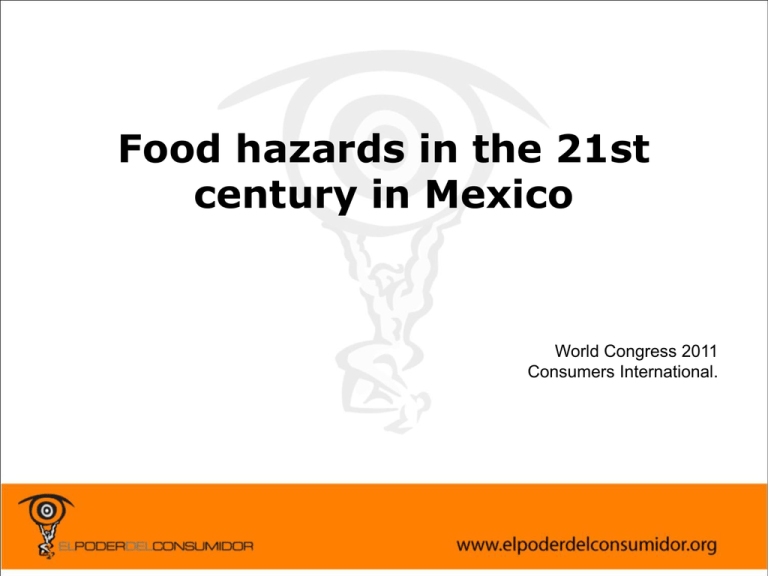
Food hazards in the 21st
century in Mexico
World Congress 2011
Consumers International.
Mexico
Some general statistics
population 107,431,230
World Congress 2011
Consumers International.
México
.
México is located between the United States and Central America
“so far from God and so close to the United States”
Porfirio Diaz
Mexico is a culturally mega diverse country with 60 linguistic communities
Its biological and cultural diversity has located Mexico like one of the 11
origin centers of the most important crops of the world
The “Milpa” or Maize Field
Unlike other regions of the world that had as a food base the cultivation of a grain, in
Mesoamerica there was the development of a more complex agricultural system called
Milpa that maintained an ecological and nutritional equilibrium
Changes in the Eating Habits
In 14 years the spending of the population in fruits and vegetables dropped
30% and the spending in soft drinks increased 40%
Nutrition Health
The Mexican infancy occupies the first place of overweight and obesity in
the international scale
Second place of adults with obesity
In only 7 years the increase of cases with overweight and obesity among
children from 5 to 7 years of age was of 39.7% (1999 -2006)
Comparative of the national prevalence of overweight and obesity in population of 5 to 7 years of age acording
to the National Nutrition Survey (ENN) 1999 and the National Health Survey (ENSANUT) 2006, by sex,
according to the criteria proposed bye the International Obesity Task Force (IOTF). México
Women from 12 to 49 years of age
70
60
Obesidad
Sobrepeso
32.4
50
21.7
40
30
18.7
20
10
30.8
36.9
16.4
0
1988
1988
1999
1999
2006
2006
This has been the most accelerated growth of overweight and obesity worldwide
Between1999 y 2006, only 7 years, the average waist circumference in these
women increased more than 10 centimetres
The epidemic of obesity and its consequences in morbidity
160
150
High Blood Pressure
140
Diabetes
130
120
110
Heart Attacks
100
Cirrhosis
90
80
Cerebral Vascular Disease
70
80 81 82 83 84 85 86 87 88 89 90 91 92 93 94 95 96 97 98
Costs due to overweight and obesity: the financial crisis of the
health care system
Millones
Millions
of pesos
de
pesos
306,000
300,000
250,000
160,000
200,000
150,000
100,000
67,000
35,000
50,000
2000
2010
2020
2030
The Causes
“the epidemic of obesity it is not anymore the result of the sum of bad individual habits; it´s the
consecuence of an obesigenic enviroment that promotes it, meaning, that produces obesity
Number of junk food commercials per hour in TV and its
incidence in children´s overweight and obesity
Number of commercials per hour on
between
TV duringAssociation
childrens programs
United States
United Kingdom
Germany
Finland
Denmark
Belgium
Austria
Sweden
Norway
-
-
Seven EU countries, USA
24
11
and Australia
17
10
14
6
Correlation r=+0.86, p<0.005
12
6
12
5
4
2
4
1
2
1
0
0
30
25
Prevalence (%) overweight
México*
Australia
numbers of adverts for
sweetTotal
and fatty foods
Junk food
shown on children’s
adds and the adds
television
prevalence of overweight
32
11.25
children in the population
Sweet, fatty food advertising
20
15
10
5
0
0
50
100
150
200
Number of adverts / 20 hours
Lobstein and Dibb, Obesity Reviews (6) 2005
250
The Schools: obesigenic enviroment
Children between 1 to 5 years of age present only 5% of
overweight. At the begining of elementary school,
meaning 6 years old, there´s 25% of overweight and with
the children of 11 to 12 years it increases to 33%, which
is at the end of elementary.
48.2
75
77.7
50.0
50.0
52.9
50.9
60.0
47.7
70.0
%
75.3
80.9
66.5
71.8
87.9
91.1
87.4
77.1
80.0
78.8
90.0
81.2
100.0
89.8
The Schools: obesigenic enviroment
40.0
30.0
20.0
10.0
Primaria
Pastelitos
industrializados
Agua sola
embotellada
Jugos
embotellados
Fruta fresca
Alimentos fritos
Refrescos
Tortas,
sándwich
Botanas
industrializadas
Dulces
0.0
Secundaria
By the time children get out of school, with breakfast and what they eat at
school, they´ve eaten around 1,000 calories; and they still need to eat their
lunch meal and dinner.
The standard food hazard of industrialized food
Addictive composition
The combination of high levels of sugar, grease and salt produce
addiction, a very well known aspect by the industry that they call “the
three points of the compass”. This addictive character can be
considered the biggest problem we are confronting when it comes to
the composition of industrialized food.
Chemical composition
The growth of scientific evidence of the impact in children´s behavior
that is caused by the different artificial food dyes as well as the
carcinogen potential of other colorants show the damage that the
exposure to this synthetic additive cocktail can be generating; among
the products aimed to children, the exposure and damage is a lot
higher.
.
Examples of some products that have synthetic additives that are
associated with damage in children´s behavior and with cancer
Products with colorants associated
with ADHD
•
•
•
•
•
•
•
•
•
•
•
•
Yogurt Dan up strawberry
Pineapple fruit bar
Strawberry cookies “sponch”
Candy Pulpa Toons
Crazy Dipps
Tama Roca
Chettos
Froot Loops cereal
Choco Crispis cereal
Nesquick cereal
Sun chips banana´s with chile
Candy “panditas”
Products with carcogenic colorant
Caramel IV
•
•
•
•
•
•
Aguita pureza apple flavor of
Bonafont
Aguita pureza grape flavor of
Bonafont
Water with extract of Jamaica of
Bonafont
Be light Jamaica flavor
Pepsi cola
Coca cola
There are THOUSANDS of products aimed to
children that have these synthetic additives
Against Junk Food inside the Schools
El Poder del Consumidor
(EPC) has made forums with
experts, protests in front of
the
education
ministry,
healthy
school
lunches,
press conferences, videos,
among
several
other
activities. With a team of 3 to
4 people the organization
has become one of the main
organizations with public
presence that pushes for
healthier options of food
inside the schools.
Against Junk Food Advertisement
EPC has presented complaints against junk food advertisement in Mexico specially aimed to
children, before the consumert´s defense organism in the country, complaints with the
human´s rights commision, has made studies related to junk food advertisement , has made
forums with experts, has made designs, videos and awards to the worse commertials
Results
We put the topic of junk food advertisement in the public agenda and with the
threat the industries presented their self regulation code of advertisement aimed to
children. Now we are pointing out that the self regulation does not work and that it
is necessary an official regulation. We are working in a group called by the
PanAmerican Health Organization (PAHO) in this matter.
THANKS

